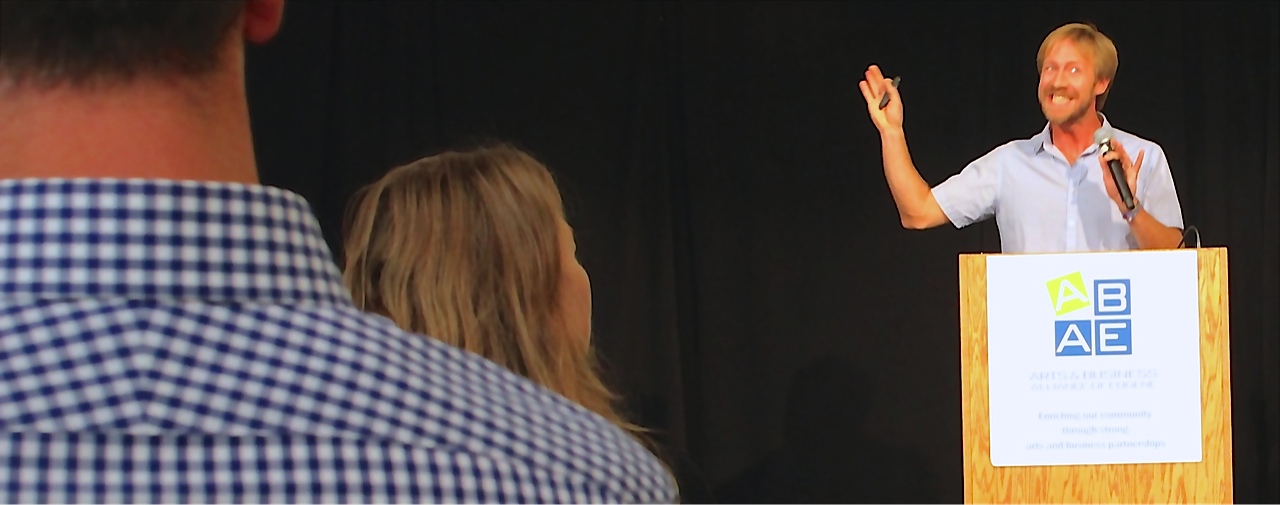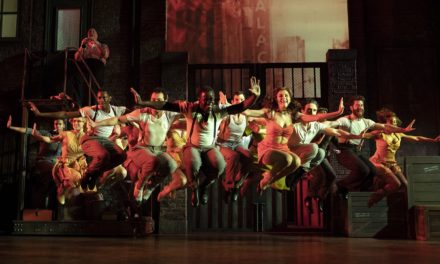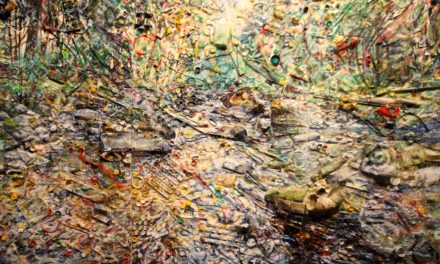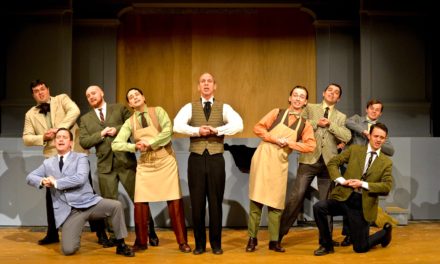By Randi Bjornstad
Author and self-described “arts provocateur” J.C. “Jeff” Geiger charmed his audience Friday morning as he delivered the keynote address at the semiannual breakfast of the Arts and Business Alliance of Eugene.
Besides bestowing honors on outgoing Eugene Mayor Kitty Piercy and listening to a string quartet of virtuoso high school students, the gathering that filled the lobby of the Hult Center for the Performing Arts relished Geiger’s account of repeatedly failing — but (happy ending here) finally succeeding — at at his passion for fiction writing.

A string quartet from the Eugene-Springfield Youth Orchestras, including violinists Owen McCoy and Isabelle Morgan, violist Mary McCoy and cellist Anthony Clemons, entertained the crowd at The Arts and Business Alliance of Eugene breakfast.
Along the way he held a series of fairly bureaucratic jobs plus a much less predictable one as the artistic director of the No Shame Eugene Theatre, which gives just about everyone who wants it a chance to take the stage if they’re among the first 15 acts to sign up on any given night.
But no one describes J.C. Geiger the way he does himself, to wit this little summary on his website, jcgeiger.com:
“J.C. Geiger has eaten the beating heart of a snake, been deported from a full-moon party, and spent a short time locked in a Bolivian prison. He also writes fiction. His short works have appeared in the pages of Murky Depths and Horror Garage, and onstage at The Second City in Chicago …”
Then he offers a “special note to writers and readers”:
“J.C. Geiger’s life sounds pretty darn catchy when all of his accomplishments are neatly summarized on one paragraph. It is important to note: It took J.C. a long, long time to sell his first book. Sure, prisons and full-moon parties were involved. But mostly basements. Small rooms. Too much coffee. Sunless days, head in his hands wondering: why, why the hell is this my J.C. Geiger’s life?”
But he’s happy enough now, and he shared his latest joy with his audience. That very same day, the publisher of his debut novel, “Wildman” — that would be Disney Hyperion — released the cover picture for the book, which he then flashed on twin big-screens near the podium, to roars of delight, his own included.
The book — which he described as “what happens when a high school valedictorian’s Buick Century breaks down and strands him for five days in a remote roadhouse” and which is based loosely on Geiger’s own experiences and fantasies related to his youthful ownership of said unreliable ’93 Buick Century — will be released next June.
In the meantime, he’s happy to give an inspirational talk, sharing the pitfalls that plagued him in his quest for successful authorship, a kind of self-sabotage he believes many other people also share.
It’s all about risk and how much people are willing to assume it and cope with it, Geiger said. He illustrated his point by first asking the audience how many among them considered themselves to be nervous airplane passengers (a whole lot) and how many considered themselves to be nervous automobile users (only three).
The risk of dying in a plane crash is about 1 in 1.5 million, Geiger said, whereas the risk of dying in an auto accident is more like 1 in 28. But even though we all know that airplanes are statistically way safer, as human beings we generally persist in acting in the same way, fearing air travel much more than car trips, he said.
That’s the psychological aspect of risk, and the physiological can be at least as limiting, Geiger said.
Human beings were really built for quick stress reactions such as “escaping the mountain lion that was about to eat us,” he said, not for longer-term stresses of modern life that seem to build up and paralyze our abilities to succeed and he freely admitted that’s exactly what stymied his writing career for so long.
His own long journey to become a successful writer started back in the days when people mailed a manuscript to a publisher, including a self-addressed stamped envelope for the reply.
“You would fill it out and send it all in, and then you would wait for months, wondering when you would hear,” Geiger said. “Then, 98 percent of the time your own envelope would come back to you with a note that says ‘no’ inside. It was kind of like someone telling you to go out and cut your own switch.”
He claims to have wallpapered his entire kitchen with rejection slips, but that could be an exaggeration. In any case, Geiger became so averse to the idea of more of them that he considered abandoning all hope of being published.
“My last-ditch effort was going to a writer’s retreat in Washington — I went in my ’93 Buick, which broke down on the way home near Gig Harbor,” he recalled. “In that moment, I basically surrendered to the fact that I would never be a writer. I wrestled with that idea for about a month, and then I said to myself that I had to keep on doing it — my previous mistake had been worrying too much about whether I would be successful instead of whether what I wrote would be the truth.”
Even then, it took several years — and much self-doubt — before “Wildman” was accepted by a publisher.
“I wrote and wrote and wrote, and I didn’t expect it would ever be published, but I showed it to a friend, and he said, ‘This is the best thing you’ve ever written,’ ” Geiger said. “So I went back to the retreat and an agent read it and accepted my book.”
His ultimate message to members of the arts-and-business group, he said, is that “Risk is actually beneficial — if you fail, all you have to do is try again. In this day and age, you are not going to be eaten by a mountain lion.”
He showed the audience a picture of a guy cradling his forehand in his open hand, as if in despair.
“In fact, the worst thing to fear if you mess up is a ‘face palm’ when you think, “Why, why,’ ” Geiger said. “All that stands between you and success is being able to deal with that ‘face palm’ moment.”
In the same way, he urged artists to continue to take the risks necessary to create and market their work, and encouraged the business community to take risks to support the arts and give artists the latitude both to succeed and fail.
Remember Eugene Skinner, the founder of Eugene, who had to be strong enough to take a risk “and be able to take the ‘mudhole’ thing,” Geiger said.
Throughout his talk, Geiger had woven elements of Maurice Sendak’s children’s book, “Where the Wild Things Are,” in which a boy named Max bravely traveled into unknown territory, facing fearsome creatures before returning to everything familiar.
After all the risks he took, Max returned home, Geiger quoted, “where he found his supper waiting for him, and it was still hot.”
Good advice, he said. “Don’t be afraid to face your risk — your dinner will still be hot.”












